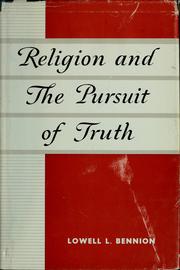Check nearby libraries
Buy this book

From Amazon:
Lowell Lindsay Bennion (1908-1996) was an American educator and counselor, who founded the Institute of Religion adjacent to the University of Utah. He also founded Teton Valley Boys Ranch and served as its director for many years. He served as a bishop in the LDS Church. The first food bank and homeless shelters in Utah were founded by him. He is also the author of many books such as The Best of Lowell L. Bennion: Selected Writings, 1928-1988, An Introduction To The Gospel, The Things That Matter Most, The Religion of the Latter-Day Saints, etc.
He wrote in the Foreword to this 1959 book, "Students of science and philosophy at universities frequently find it difficult to harmonize their newly won knowledge with the religious faith they have acquired at home and in the Church. This difficulty of reconciling the path of reason and the way of faith is neither surprising nor new. It has been us since the first meeting of the great cultures of the Hebrews and the Greeks. In Western civilization ... we have inherited two traditions: the faith and morality of the Hebrews and early Christians, and the life of reason initiated by Greek philosophers... This brief volume is an outgrowth of a desire and an effort to help students accept both traditions as being valid and of infinite worth. It is tragic when a student turns his back either on faith or a life of reason."
Here are some additional quotations from the book:
"One gains knowledge in four ways: (1) by accepting it on the authority of someone else, (2) by thinking, (3) by experiencing, (4) and by feeling which may be called intuition, mysticism, inspiration, or revelation." (Pg. 24)
"Revelation, like intuition, is a private communication. How can we decide between the claims of Micah and the popular prophets whom he condemned? Their respective teachings must be tested by reason, by experience, and by the witness of the Deity to us." (Pg. 38)
"The primary purpose of all scripture is religious, not philosophical, not scientific, not even historical in the contemporary meaning of the word." (Pg. 49)
"To know in one's heart by the witness of the Spirit that God lives does not mean that one knows all there is to know about God." (Pg. 63)
"However, the philosopher or scientist who is also a person of religious faith, finds much in his chosen field to study to enhance his vision of the greatness and the holiness of God. The philosopher and the man of faith pursue different paths to God---the way of reason and the path of revelation. Some philosophers, however, have been able to accept both as fruitful approaches to an appreciation and understanding of God." (Pg. 81)
"A person of religious faith ... is willing at least to experiment through faith with ideas, ideals, and great possibilities which he believes to have come from God." (Pg. 113)
"Latter-day Saints do not believe that all truth is contained in the standard works, or that all the truth that is not contained therein comes from the pulpit... We believe that our religion is big enough to accept well-established truth from sources other than scripture and the prophets." (Pg. 115)
"Our most basic beliefs about God, Christ, and man rest in good part on faith... It is logical, therefore, that the first principle of religion is generally considered to be faith." (Pg. 121)
Check nearby libraries
Buy this book

Times
1900-| Edition | Availability |
|---|---|
| 1 |
aaaa
|
Book Details
Edition Notes
Classifications
The Physical Object
Edition Identifiers
Work Identifiers
Community Reviews (0)
History
- Created May 5, 2010
- 4 revisions
Wikipedia citation
×CloseCopy and paste this code into your Wikipedia page. Need help?
| August 12, 2011 | Edited by ImportBot | add ia_box_id to scanned books |
| September 3, 2010 | Edited by ImportBot | Added new cover |
| May 6, 2010 | Edited by WorkBot | found a work |
| May 5, 2010 | Created by ImportBot | Imported from Internet Archive item record |










